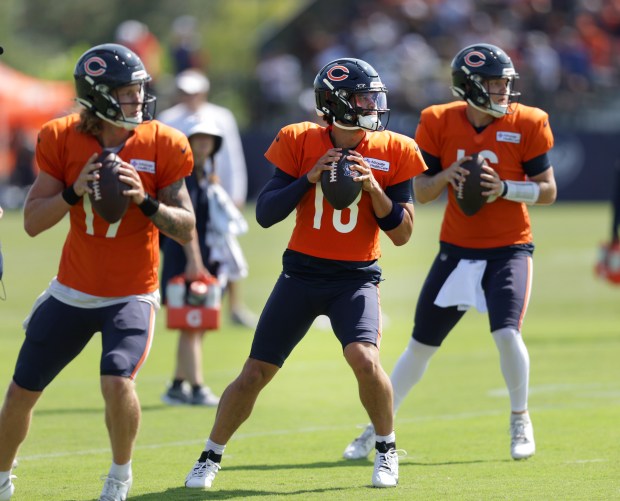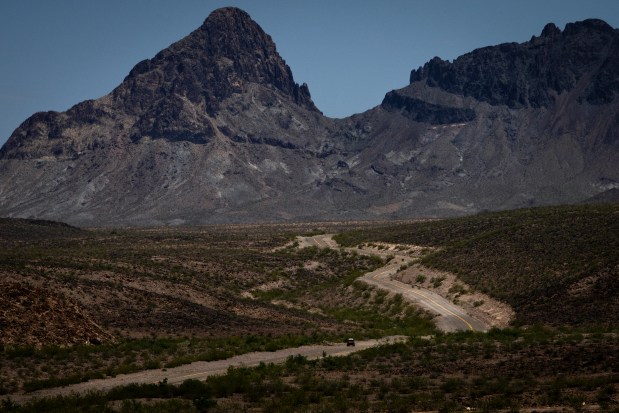Episode 1 of “Hard Knocks: Training Camp with the Chicago Bears” started exactly where it was supposed to — with a draft-night phone call to Caleb Williams and the introduction of the quarterback who hopes to revise the franchise’s tortured history at the position.
Coach Matt Eberflus said that April union will “go down as an iconic day in Bears history.” Series narrator Liev Schreiber described Williams as “a once-in-a-generation jewel with the talent to match the hype.”
All across Chicago, Bears fans got goosebumps. But there was much more to the “Hard Knocks” premiere — and there will be much more to the series — than just Williams. Episode 1 offered a compelling Nick Saban cameo; a glimpse into Jonathan Owens’ rooting interest in his wife, Olympic gymnast Simone Biles; and an unforgettable karaoke performance from offensive lineman Theo Benedet.
Four more episodes are ahead with the next installment arriving Tuesday night. So what can we expect from the NFL Films/HBO production over the next month? And how have the filmmakers identified the most compelling content to share with a national audience?
Tribune reporter Dan Wiederer recently caught up with “Hard Knocks” director Shannon Furman to discuss the series. Here are the most significant parts of that conversation, edited for clarity and brevity.
You guys have arrived at a bit of a landmark time in Bears history with so many things happening. When this opportunity arose, what was your greatest intrigue in chronicling this team in this moment?
We do a ton of research on our own, but we like to get input from the team, from people around the team. We have a producer at NFL Films who is a die-hard Bears fan. So he has been a huge, huge help in this whole process and in giving us different storylines. The Michael Jordan theme song and getting Ray Clay involved, that was his idea this week.
People have asked me a lot about where our ideas come from. And I would say 50% of it we kind of know going in and then 50% of it just unfolds as the practices are happening. We learned a ton during those three days where it was just rookies or second-year guys out there (at Halas Hall). You can kind of go all-in and mic people up that you may have never really heard of or never knew too much about. So we learned a lot in that week.
Then as things unfold in games, like with Collin Johnson, he was on our radar. We knew about him a little bit. But you score two touchdowns in a game, you’re going to find yourself on “Hard Knocks.”
The theatrical introduction of Caleb Williams on the show really resonated with people in Chicago of a certain age. If Caleb becomes the Bears quarterback to win a Super Bowl here, he becomes Jordanesque in stature. So what was the genesis of the idea to introduce him in that way?
We had been here a couple days, filming him, filming the team. And I got an e-mail and it was kind of all written up. Eric Powers is the die-hard Bears fan (on our team). He told us how (former Bulls public address announcer) Ray Clay is still in the area. We reached out. He was willing to help us out. He was actually on vacation, so we had to figure out exactly when he would be home. He helped us find a studio. The home office had to make sure we could clear the music (by the Alan Parsons Project). So once they told us that was good to go, we knew we were all-in with it.
And then it’s not even something that you have to ask Caleb to do. He’s walking out to the field every day. So we just had to pick the appropriate equipment and figure out the way we wanted to capture it. We had a couple different camera folks on it to get it from inside the locker room out to the field. So we storyboarded out that whole process. And I thought it worked really well.
As an extension of that, you guys are playing a big role in lifting the curtain on “Caleb Williams: QB1 of the Chicago Bears” to a national audience. As you’ve gotten to know Caleb and this team a little more, what strikes you the most about this introduction to an audience that’s going to have its eyes on his career for the long haul?
I think it’s his maturity. I would never guess that he is a rookie with the way he’s handled things and just carried himself at this camp. He seems like he’s like a fifth-year guy. He’s been doing this for a long time. So that’s the biggest thing I’ve seen about him. The way that his teammates are taking to him, too, which I think is all part of that. The fact that he comes off as mature as he is, it just seems like he really has a great grasp of the locker room at this point, and it’s only going to get better.
This isn’t the first time you’ve had the No. 1 pick on “Hard Knocks.” In 2016 in L.A. with Jared Goff, in 2018 in Cleveland with Baker Mayfield — did those experiences inform the way you went about the process with Caleb? Is there anything that translates between those experiences and the one we’re going through?
For sure. Jared is still a close friend of mine. And I think we learned, like, the blimp scene (in 2016) gets brought up a lot where Jared wasn’t sure where the sun was setting and rising. And, I mean, we laugh about it now. But I think at first it was kind of brutal for him. It was something that we thought was funny. He thought it was funny at the time. And then when you go on and you don’t have a ton of success your rookie year, all of a sudden it’s like you become dumb. And he’s not dumb. That’s ridiculous.
So I think we are much more aware of things like that in this day and age and want to make sure nothing like that would happen with Caleb. But they’re all different. Baker is very different than both Jared and Caleb are. And the amount of exposure he had to the media at that time, he had a whole show following him around leading into the draft process. So I think — and we do this with everyone, not just the first pick of the draft — everyone is their own person. So you get to know people and figure out how best to deal with them. What works for them, what works for us. It’s all part of this whole process with this show. It’s just meeting people and figuring out personalities.
With Nick Saban, who was Eberflus’ coach at Toledo and remains a mentor, was that inclusion for the show accidental or by design? And secondly, was that interaction between those two in Eberflus’ office a natural meeting or was it somewhat staged?
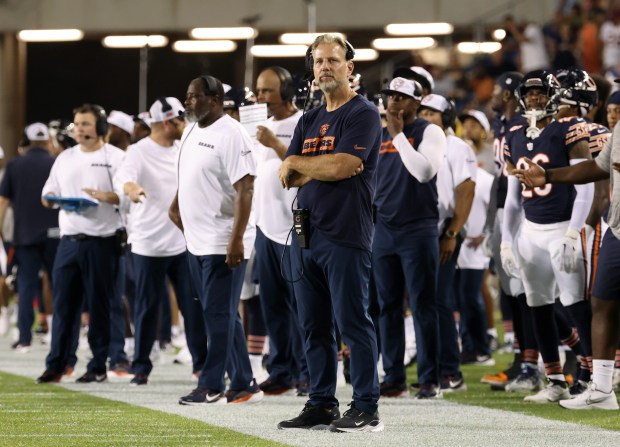
I mean, I wish I could stage a scene with Nick Saban. That was definitely not staged. I believe he was in the area for a speaking engagement. I believe that’s what Coach (Eberflus) told me. And when he heard that, he was like, “I want to get him over here to help talk to the team.” So it was perfect timing. Worked out for all of us.
We obviously have the building covered properly to get those moments on camera. And there probably is a whole lot more that we could use from those conversations. He’s a fascinating coach who has had a ton of success. And their relationship really is genuine.
So many storylines are really compelling. From the outside looking in, it feels like the hardest part must be trying to pick the best of the best of what you have. When you’re confined to a 55-minute block for each episode, how do you go about identifying the best of the best and then also trying to figure out, how do we tell this story in a way that’s meaningful while understanding you’re going to have to leave a lot of really good stuff on the cutting-room floor?
You have to know you have four more shows. So it’s kind of like, what can you hold on to for another show? I know there was a player that we really liked that we thought was going to be introduced the first week. And then Collin Johnson goes and scores two touchdowns. All of a sudden you’re scrambling. Like, “I need to go get a shoot with Collin tomorrow.” So we went to the coffee shop with Collin the day after the game. So that happens all the time.
You have to adapt. What can you hold on to? What has to be used in the moment because of the timeliness of it? Like the Jonathan Owens situation, the Olympics are very timely. It was obviously happening right then. So that all needed to be included in the first show.
But it’s really important to us that Jonathan’s football story gets told too. So you’re going to be seeing more of that in the coming weeks, his journey and how he made it from the Packers to here and what his career has been like. So that’s the most important thing. It’s knowing what you can hold on to and what you can’t.
There’s obviously going to be a guy or two who we love but doesn’t get introduced in the show. But I really try. One of the things since I’ve been the director of the show is that I really don’t want to waste people’s time. So when we find somebody we like, I always say it’s quality over quantity. We’ll put more resources toward finding the right people and making the scenes we do with them as good as they possibly can be instead of just running around shooting everything that’s happening and having nothing actually hit.
Can you give a feel for the size of your team working on this project and what the process is, from gathering to filtering to selecting to actually piecing together a show?
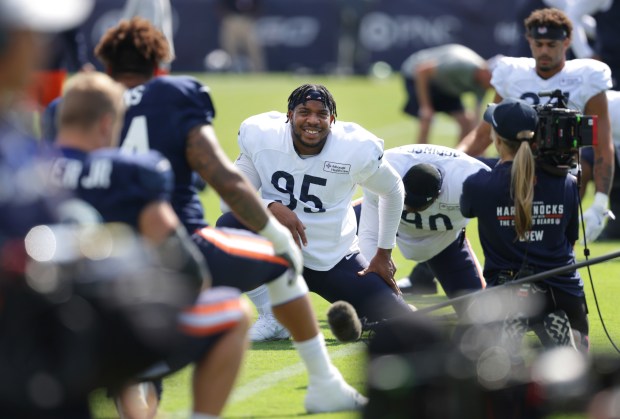
The Cliffs Notes version of that is there are 35 of us here on location right now. And then there’s probably another team about that size at home back in Mount Laurel, N.J., at NFL Films. So we had, on any given day, at least eight cameras at practice. They’re not all on the field. Some are elevated. So we say there’s about 400 hours of video shot for every episode that goes on the air.
There’s a lot of communication that goes into it with us and the home office. And the way the project is organized, our producers are given a character. So last week, someone was assigned Caleb. Someone was assigned the wide receiver group. Someone was assigned Coach Eberflus. And then there’s a whole other group of people who are in charge of making sense of those segments that are put together with everything that everyone cuts.
Then there’s a whole different team that works on the game, separate from what goes on during the week. So I like to tell people at this point it’s kind of like a choreographed dance, the way everything goes.
I want to say this is the 23rd season of the show. They weren’t all consecutive. But with more than 20 years of doing this show, we probably learned something new every year that we use to make the show better for the following year. At this point we have a ton of resources to do this the right way.
You’re dealing with a group of players that has almost grown up on camera. Their existence has been on social media. In your time working with the show, how has that changed? There’s always the thought of how much of an intrusion this may be. But it seems like there’s a whole generation of people now who don’t feel like it’s an intrusion at all because of the way they have lived their lives for 20-plus years.
I think you said it right there. I’ve seen it change just from 2015. That was my first year as the assistant director on this show. So this is my 10th season now doing this, and kids have just grown up documenting their every move and whatnot. So it’s definitely different.
I’m trying to think if there’s been one person here who has told us they don’t want to be a part of this, but I don’t think it has happened. I think every single wire request we’ve made has gone through. So it’s been kind of nice.
It wasn’t always like that at the beginning. My first season at NFL Films was 2004, so I edited on the Chiefs version of the show, which I believe was 2007. And then the Cowboys did it. Tony Romo didn’t want to be mic’d. I’m not sure if Tony Romo ever even wore a mic for that show. I know Matt Ryan was kind of difficult to get to do it.
Now, we have other ways to figure out how to cover things. You’re around the quarterback group, so you still get access to those guys. But it is a whole different generation of guys now who kind of get it more. They get the branding. They get what the exposure can do for them. And it’s made our lives a little bit easier.
Early on, did anything stand out to you that was unique about Halas Hall, the Bears organization, somebody you’re dealing with?
I probably can’t talk too much about it yet because it’ll be a character that we’re developing. But some of the guys who are going to be trying to make this team, I feel like we have some of the best stories we’ve ever had. Just genuinely good people who have goals and other things going on in their lives. It’s going to be really cool for us to tell some of these guys’ stories — about their journey, on making this team. And I think you’ll start to learn about some of them this week.
We love the quarterback room as a whole. So it works out for us that Caleb Williams is the No. 1 pick of the draft this year, but all the guys in that room are pretty awesome. So we like that whole group and we’re hoping we can make them all a part of this whole experience. They’ve been great so far. So hopefully you’ll see more of them this week too.
And just another thing of note here: This facility is beautiful. Just the layout of camp and where we are with the marshes and things like that. Flying the drone early in the morning, visually it’s kind of stunning here. It’s been pretty awesome.
On the topic of the quarterbacks room, one clip that came out during the Hall of Fame Game was of Caleb announcing his signing bonus in a team meeting, and Tyson Bagent began having the fake seizure in the front row. What have you learned about Bagent as the backup quarterback and a guy who is full of character?
Yeah, we love Tyson. He’s definitely on our radar. So we’re hoping to get more into him this week again. I don’t want to give too much away about things we may have already done with him, but I loved that. I also loved his reaction to the singing (of Theo Benedet). When you see him singing along with “Proud to Be an American,” that was one of my favorite moments in the show. I said that to my assistant director when we were watching: “Did you notice Tyson’s reaction yet?” And he started looking at him and was like, “Oh, my God, I hadn’t.” So, yeah, he’s definitely someone we want to get more into.
This is my 12th season covering this team and I can’t remember a group in the locker room that has such a surplus of personality and character and vibrancy. I imagine that makes it a little more difficult for you to zero in on just a few stories that you get to tell over four or five weeks. But what has struck you about the overall makeup of the team and, by extension, what’s the difficulty of trying to figure out which characters are the most compelling?
We definitely have a group of guys who are on our radar already. And when players make plays in the game, that certainly helps get them into the show. It’s moments inside the team room — like we had Theo Benedet singing this past week. That’s a way to do it also. So there are definitely guys who are on our radar.
But then sometimes they don’t get in because someone else does something that’s a little bit more memorable. But we try our best to get the guys who we really like and who have been working with us and figure out ways to make sure their story gets told in the show.
So much was made before you arrived that the Bears never wanted to be on “Hard Knocks” and that Chairman George McCaskey was a big reason there was a lot of resistance. How have those interactions been with McCaskey? And because of that past resistance, have there been any impediments that maybe didn’t exist in other places?
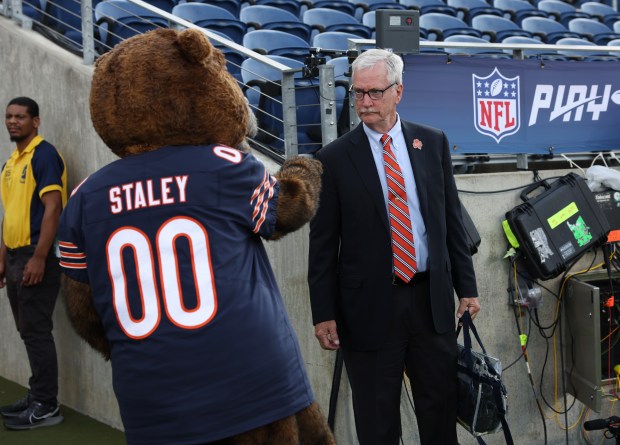
No. I mean, the team has been great. And George has been great. I don’t know that you’ll see him on TV or anything, but he’s been super welcoming. Everyone here has been very welcoming. I think it’s relationship building, honestly. The fact that we had some time to get to know people. I made three trips here before we started filming. So you start building trust. You get to know each other on a personal level. And it’s not about the show and what you’re doing that way. Just know my background, where I come from, how long I’ve been doing this, why I love doing this. And then you form a mutual respect.
I’m having a lot of fun doing this this year. Last year (with the New York Jets) wasn’t the easiest at times because it was so late. We didn’t know about the show until a couple days before, so it took more time for those relationships to build. Here, the fact that we had some time to really get to know everybody leading into this process was huge and has been very helpful.
Just to tie a bow on everything, we all understand who the headliner of this team and this series is. It’s Caleb Williams. He’s one of the most fascinating athletes in the country right now. How much more Caleb can people expect in the next month as they tune in each Tuesday night?
Yeah, I would expect to see Caleb in every show. I don’t know if it’ll be quite as much as it was in the first episode. He was obviously one of our main focuses for that. But we love the quarterback room as a whole. So even if it’s not seeing him as the feature of it, I imagine he’ll be around those other guys a ton. We really want to tell their stories also. So I think you’ll be seeing Caleb in the other episodes too.


